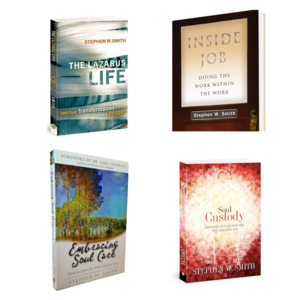by Stephen W. Smith
As I survey the inner landscape of the market and ministry leaders that I work with regularly, most are discouraged, drained, depleted and depressed. It seems the ways in which we’ve sought to navigate political discord; racial tensions and a global pandemic are not sustainable. Add to that our personal lives, stresses, and schedules. Most of us are feeling the heavy weight of all we’ve been carrying to keep life working and together. Yet, as I sit with young leaders like Mark, I’m hearing this: “I feel discombobulated. I am fragmented on the inside. I am unhinged.” Mark’s triage of his own soul describes many voices today.
Given our new reality, how does a leader recharge one’s soul? How do we care for our souls while caring for so much these days?
Self-Care is Never A Selfish Act
As noted author and cultural spokesman, Parker Palmer has told us, “Self-care is never a selfish act - it is simply good stewardship of the only gift I have, the gift I was put on earth to offer others. Anytime we can listen to true self and give the care it requires, we do it not only for ourselves, but for the many others whose lives we touch.”[i] Soul Care is not selfish—it is essential to be able to live well in the tension filled times which we are experiencing now.
Tough and depleting times call for measures that foster not only survival but something “more”. It is this “more” that we can explore when we talk about recharging our souls. Caring for one’s soul is about wrestling with these questions:
How can I live a resilient life in the midst of turmoil, stress, and busyness?
How does one measure one’s capacity to work, relate, parent, maintain health, and deepen one’s faith?
How can I live well when life feels so thin?
How can I live in a way that is sustainable, embracing regular times of renewal and recharging—rather than enabling patterns of hitting a wall and crashing and burning?
Re-Charging Our Inner World for Outer Action
Re-Charging is about learning to live in a resilient way. It is embracing the notion that survival is not enough—and leans into the realities of thriving and actually experiencing the abundant life now—not just in heaven. Soul Care is about monitoring our capacity and being aware of our limits. Caring for the soul is about learning to live well and lead well at the same time—to live an integrated life. Based in Scripture, modeled by Jesus and demonstrated by the ancients, soul care is a way of living—a way of recharging our inner batteries to live well and lead well.
Awakening to Soul Care
There’s an old adage which says, “When the student is ready, the teacher will come.” We awaken to our need for learning new ways of living when we realize our old ways weren’t working well for us. First, we learn. Then, we need to unlearn some things that just don’t work. Soul Care is re-learning what is vital and important.
Until one feels the inner prodding to wake up and unlearn ways that lead to exhaustion and depletion, we as humans have the uncanny ability to coast; live on auto-pilot and be creatures of habit. All of this leads to dead ends and burn out—a depleted soul. But as we learn in life, getting jarred wakes us up. Hitting a wall, living through pain, getting fired or going through some sort of crisis— be it our health, relationship tensions, or work. If you feel as if you’re running on empty, pay attention! Life could transform for the better!
Finding Our Way—finding THE Way
When we review the history of our faith, we quickly see the efforts of women and men, who found creative and necessary ways in which to live in challenging times. These ways—all based on the One who claimed to be the Way, Truth and Life—namely Jesus Christ. What we are waking up to through the pandemic, racial discord, and political tension is this: We need to become familiar with the way, combined with the truth, which will foster the life we are so desperate to live.[ii]
Trickle Charging Our Way to Life
Ours is a culture to quickly fix and provide a remedy for every problem and ailment—even the inner ailments of the soul. But any one who has ever jumped start their car because of a dead battery, learns that the soul is unlike a battery. The soul cannot be jump started. We need to practice the trickle charge approach like we do when we hook our batteries up to an over-night charger allowing the slow, steady trickle charge to bring the life. The soul, being “fearfully and wonderfully made” needs the trickle charge approach to maintain resiliency for the marathon of life.
Here are some ways to regularly practice a trickle charge approach to your soul:
1. Every month, do a “State of My Soul” Assessment. This is a 10-minute exercise to access the state of your own soul—the real condition of your inner world where everything is connected. This is essential, like a trail map or map of a mall that says, “You are here!”
The soul is like the gears behind an old wind up clock which has intricate gears connecting all parts of the clock together. Like the old song says, “The ankle bone is connected to the leg bone. The leg bone is connected to the new bone”…and so on. The state of our soul is an over-view, a sort of inner landscape survey to determine how you are doing physically, emotionally, relationally, vocationally, and spiritually. These are five of the main areas of our life—our soul—that need care.
In a journal or piece of paper, write down the five key words that describe the state of your soul. Use positive and negative descriptor words: exhausted, vibrant, worn out, fulfilled, burned out, resilient, alive, dead, and so on. Consider using The State of My Soul Assessment and use our diagram to mark “how you feel you’re doing.” Get your team do this. Ask your spouse to do it with you. Share what you discover.
2. Practice DEAR[iii] time. This is an acronym that goes like this:
D-rop
E-verything
A-nd
R-est
DEAR time involves disengaging from work, technology, phone, and colleagues ‘to be’ and ‘not do’. Disengaging involves Sabbath-keeping –one full day a week of ceasing and stopping and to do what brings you life. Sabbath literally means, “ to cease.” It takes a paradigm shift and a realignment of what’s really important in life for a leader to embrace DEAR time as much as we have production and work time.
3. Eradicate hurry from your life. Hurry leads to feeling frayed; feeling thin on the inside. The hurried life is not the abundant life. The exhausted life is not the abundant life either. Dallas Willard reminds us that “The secret to the spiritual life is to ruthlessly eradicate hurry from your life.” They key here is to practice “ruthlessly.”
Put 10-minute windows between your meetings to move around; reflect on how what just experienced impacted you; take a slow walk.
Put buffer time in your day to allow for interruptions and the unplanned.
Park further away from your office or restaurant to walk.
What can you imagine that could help to slow down?
4. Every month, or at a minimum once a quarter, take a Solo Day—a full day of personal retreat. One day of being “Solo” to think, pray, go slow and rest and read is not only a perk companies and ministries should offer, but should mandate. This personal day off and away will offer your team, family and community a better version of yourself than offering emptiness and depletion.[iv]
Re-charging the soul is a life-long pursuit. It is what author Eugene Peterson called “a long obedience in the same direction.” The decades of our leadership will require a steady practice of avoiding running our life on empty and returning time and again to the ancient paths which bring us life, happiness, and the new metrics of love, joy and peace (Galatians 5:22ff)—what the Apostle Paul calls the fruit of living in a spiritual way.
[i] Parker Palmer wrote this in his celebrated book, Let Your Life Speak
[ii] I go into depth on the ways of Jesus in The Jesus Life: Eight Ways to Recover Authentic Christianity (David C Cook, 2012).
[iii] I first learned of DEAR time through the Gottman Institute through their work on marriage but applied this here in the idea of Sabbath and dis-engaging.
[iv] I have a podcast on doing a Solo Day where I offer a way to do this and describe this in detail. See https://www.pottersinn.com/podcast-episode/ep70-solo-day. In addition I’m releasing a new book with Peter Ivey on how to do a Solo Day in January 2021. See Amazon or www.pottersinn.com.




